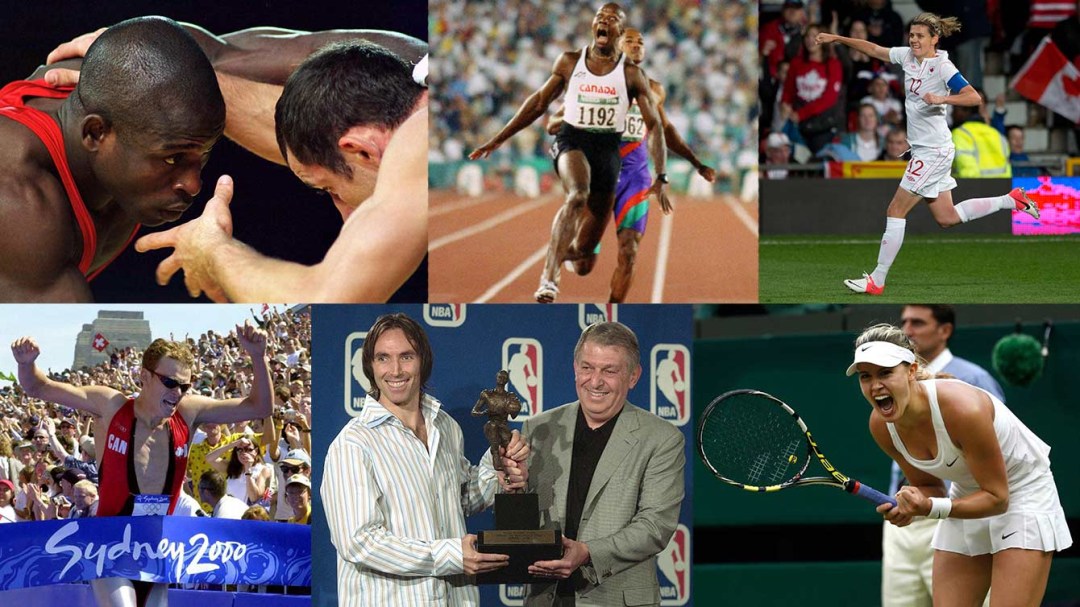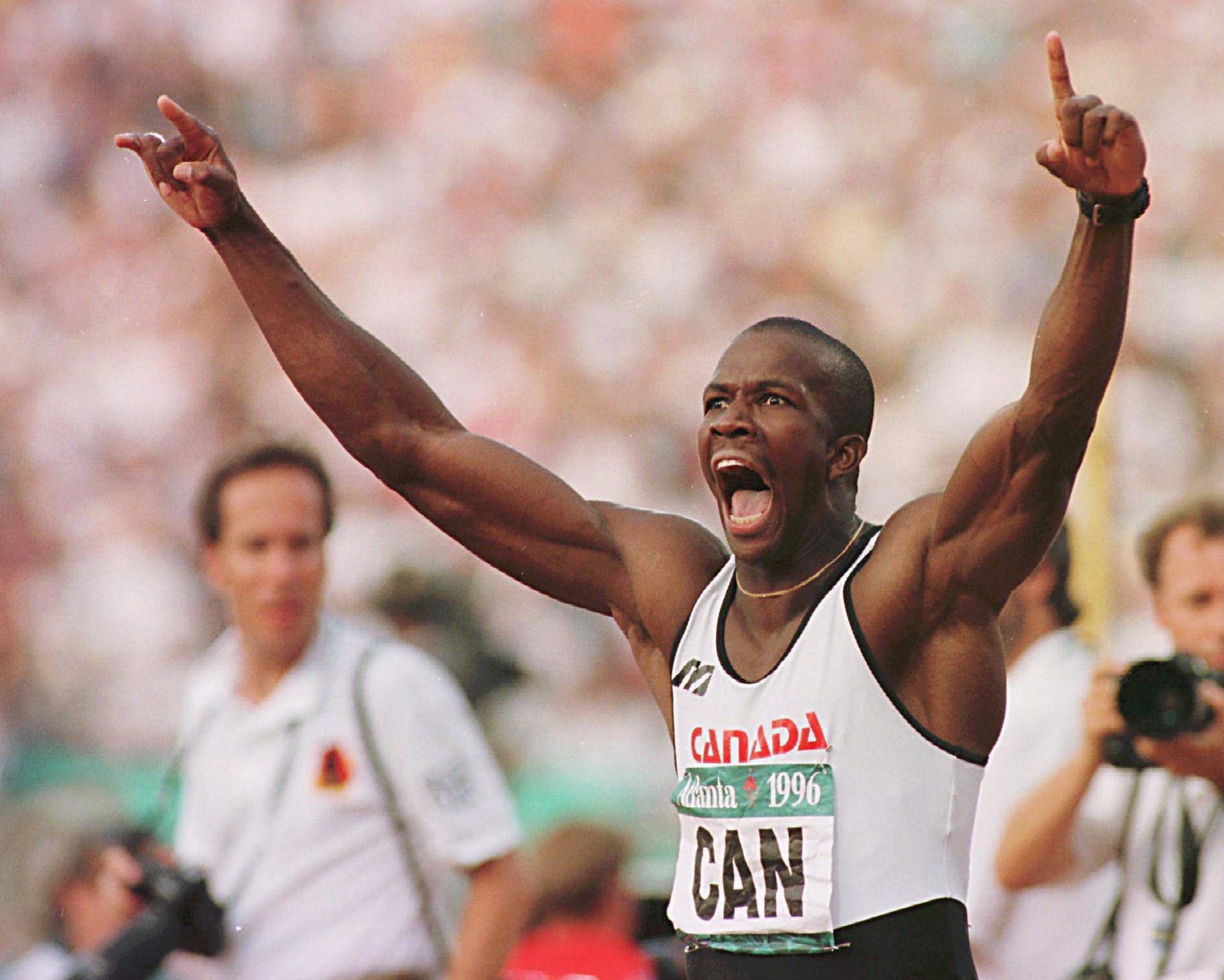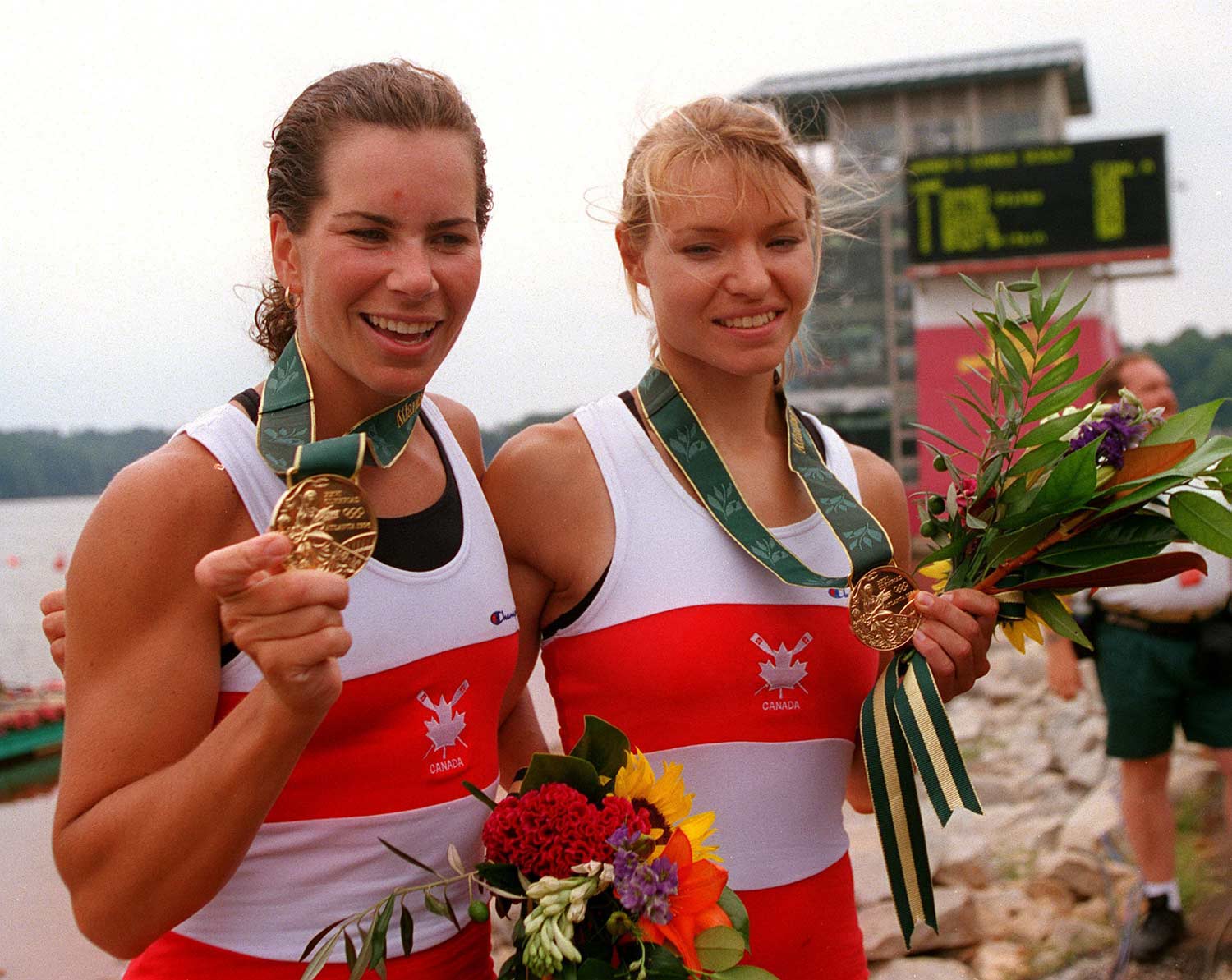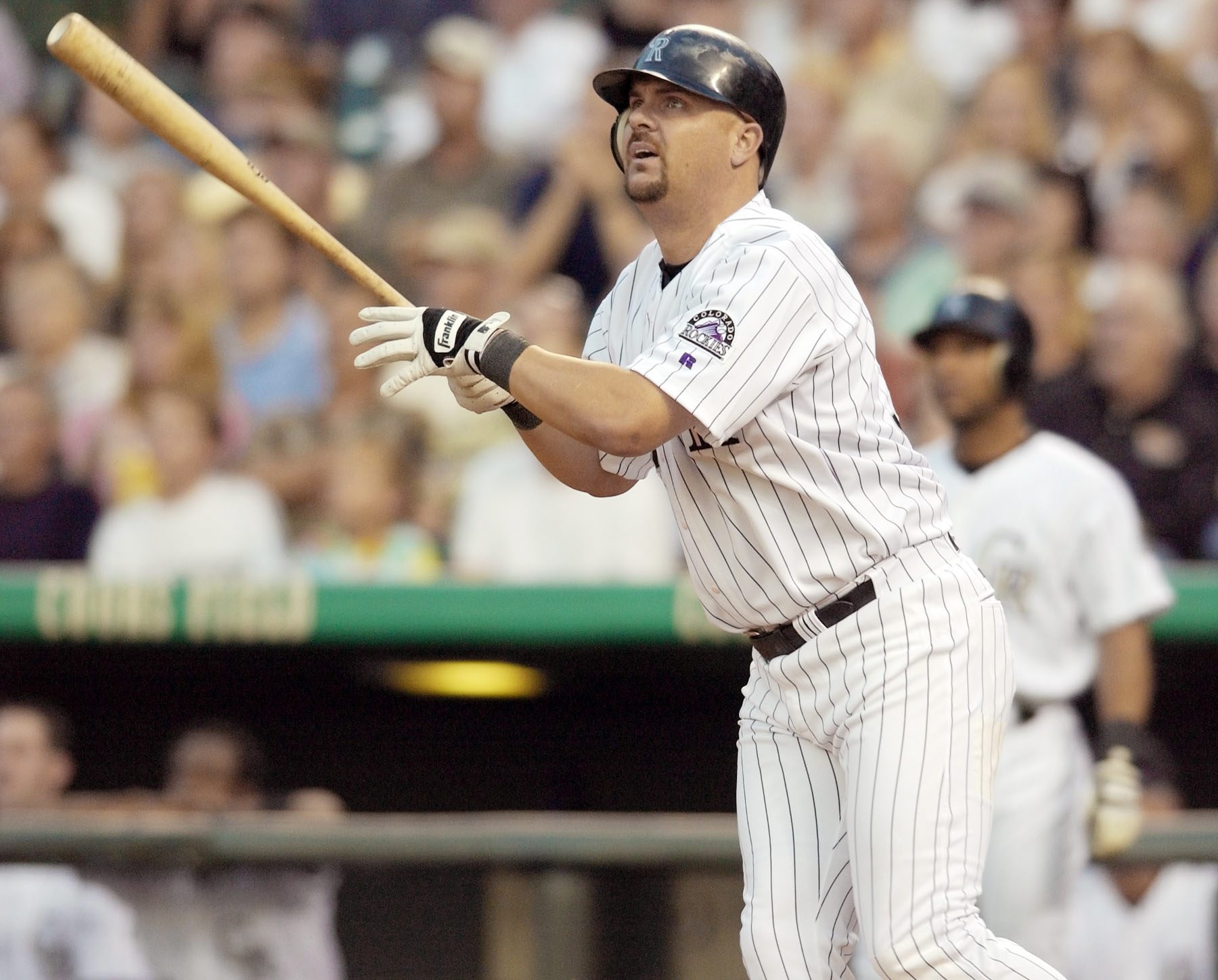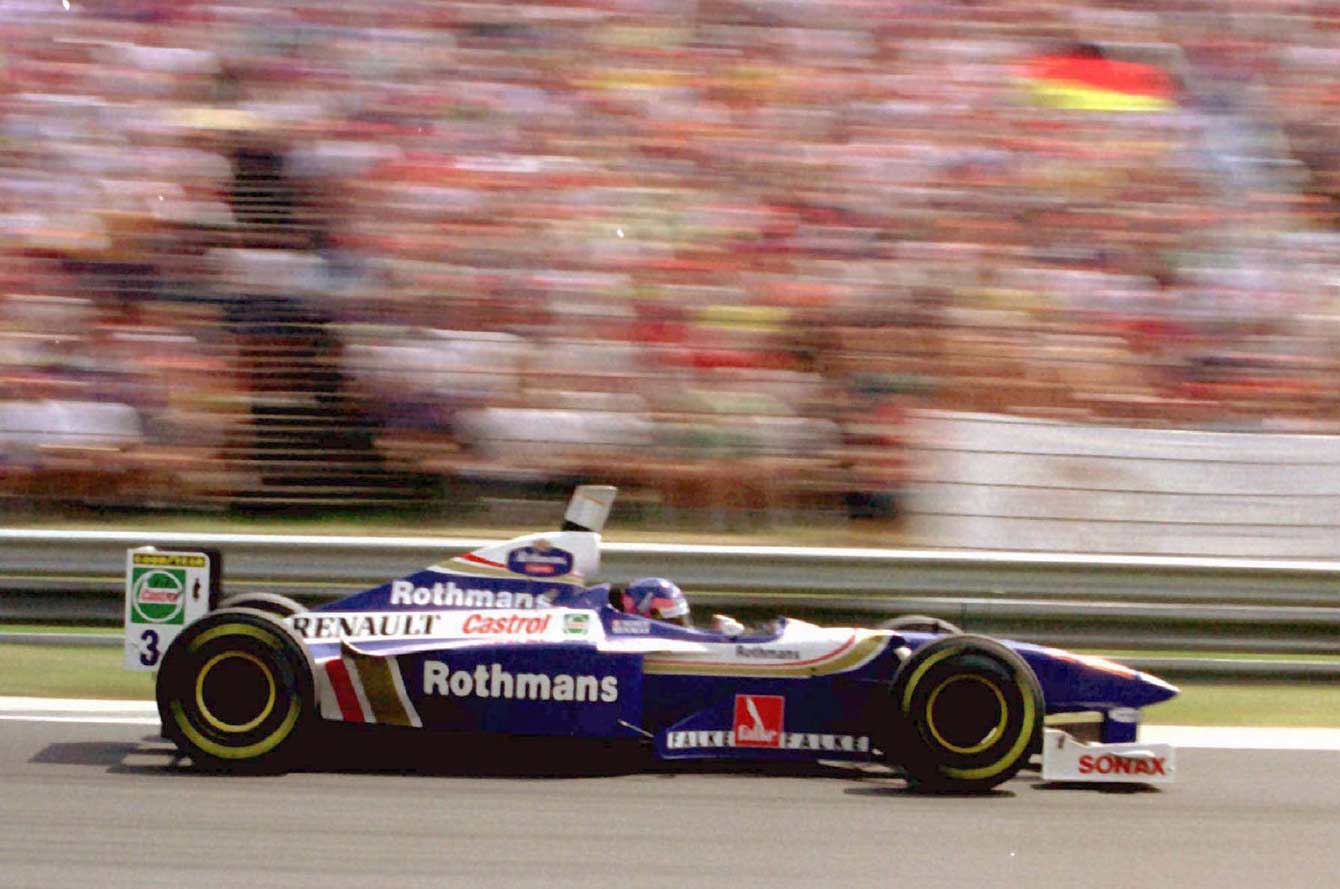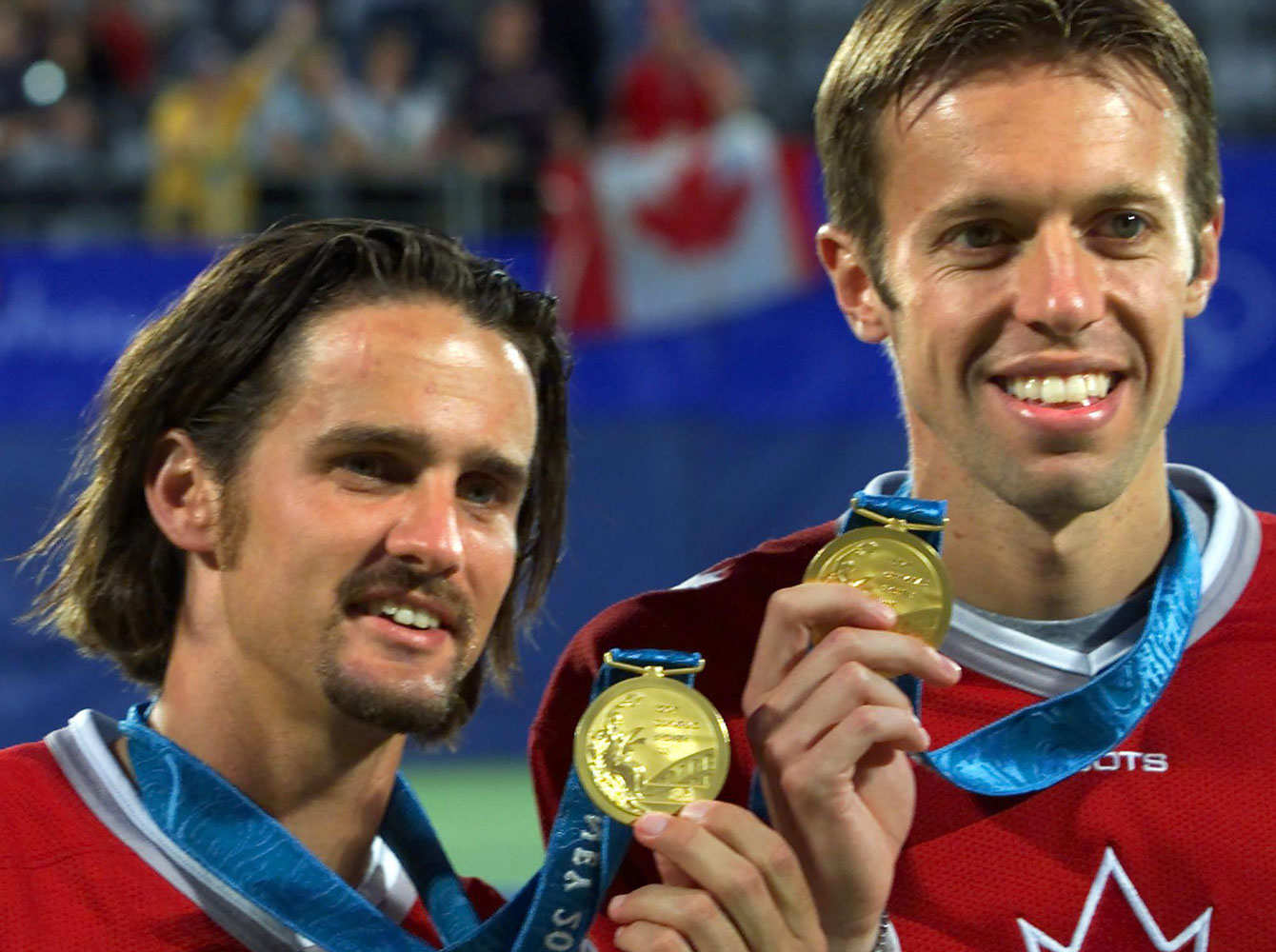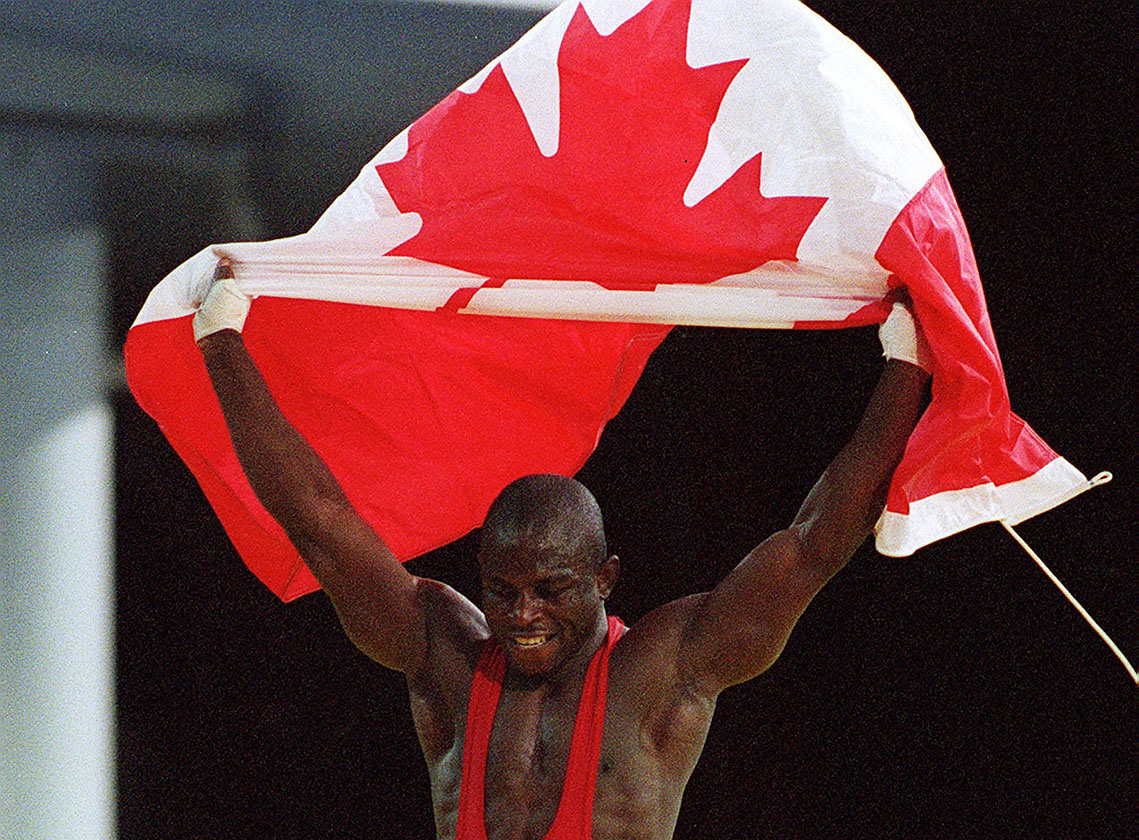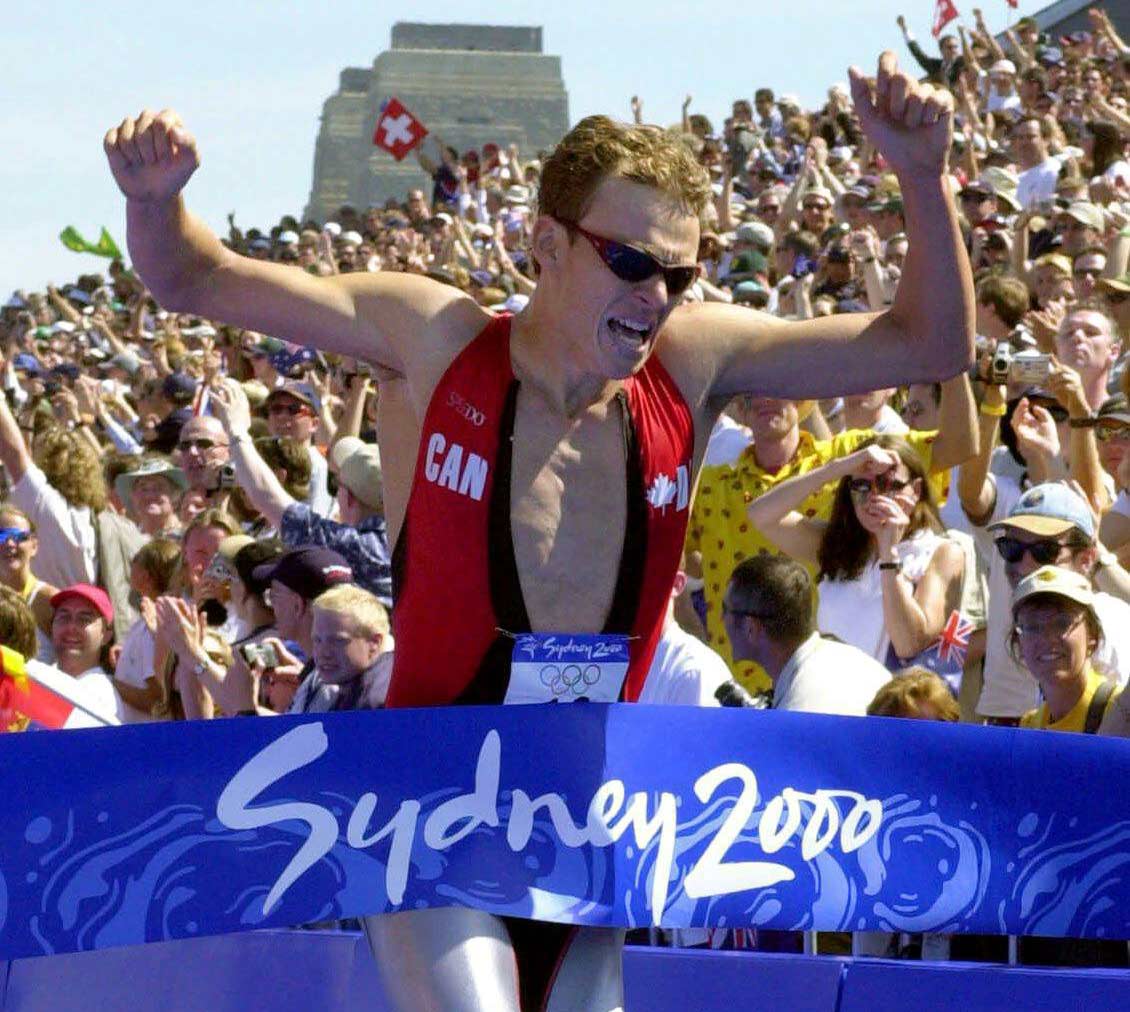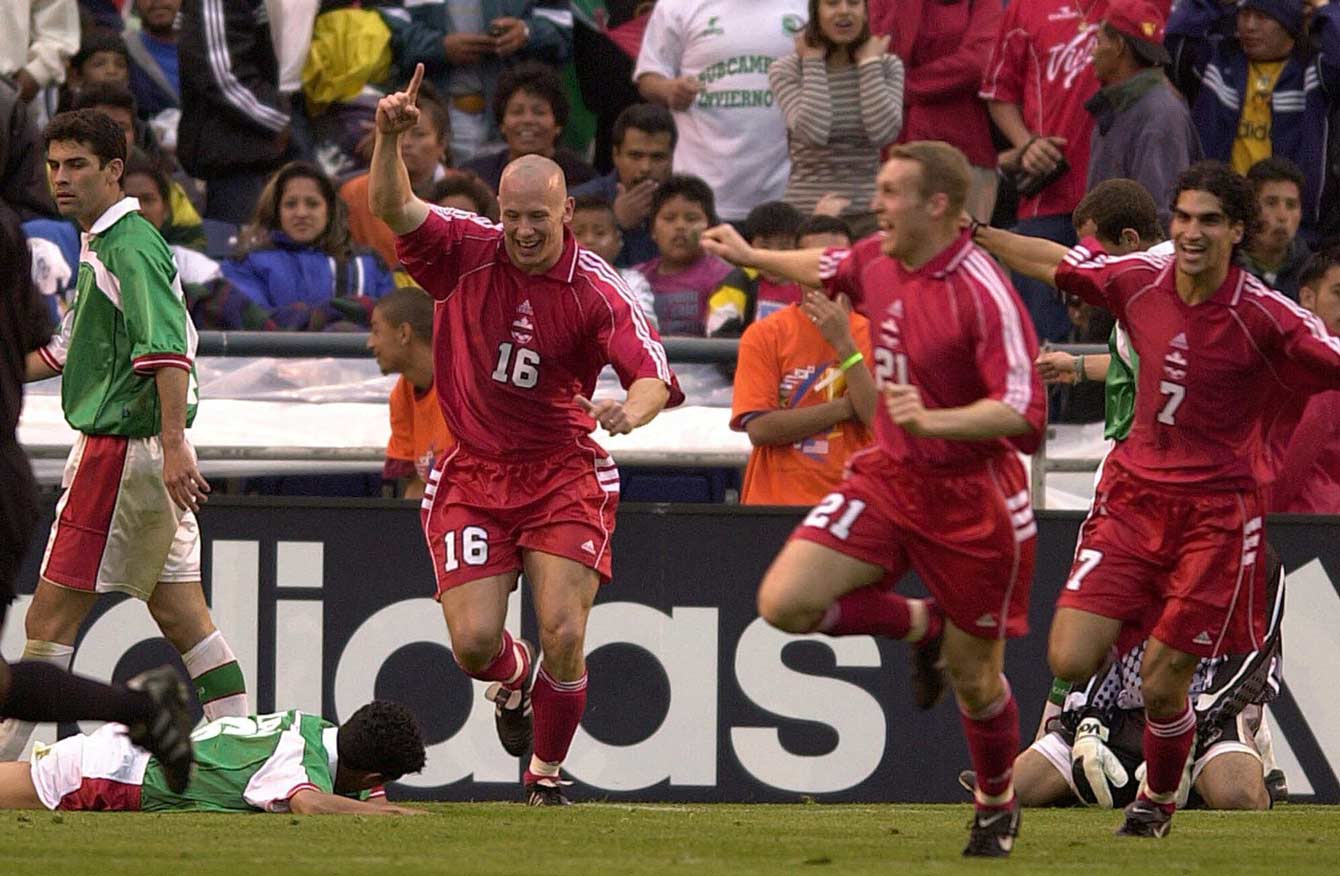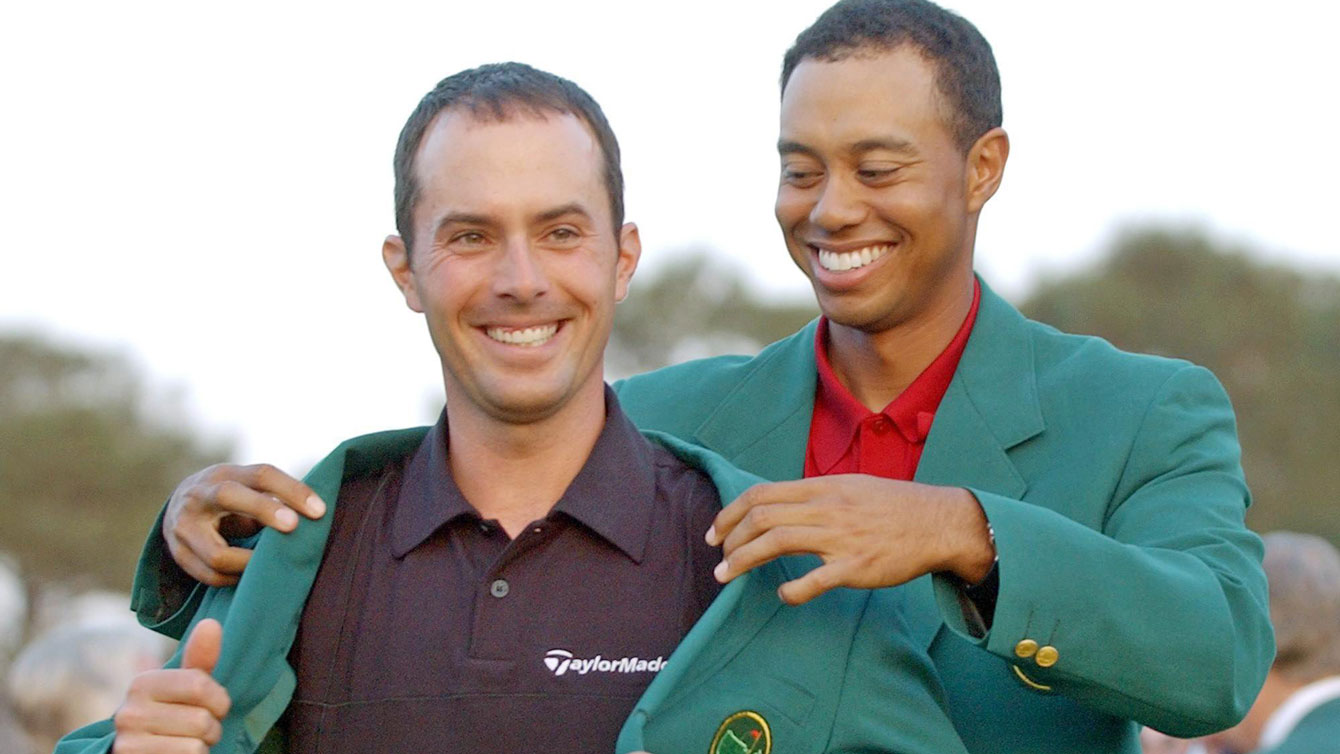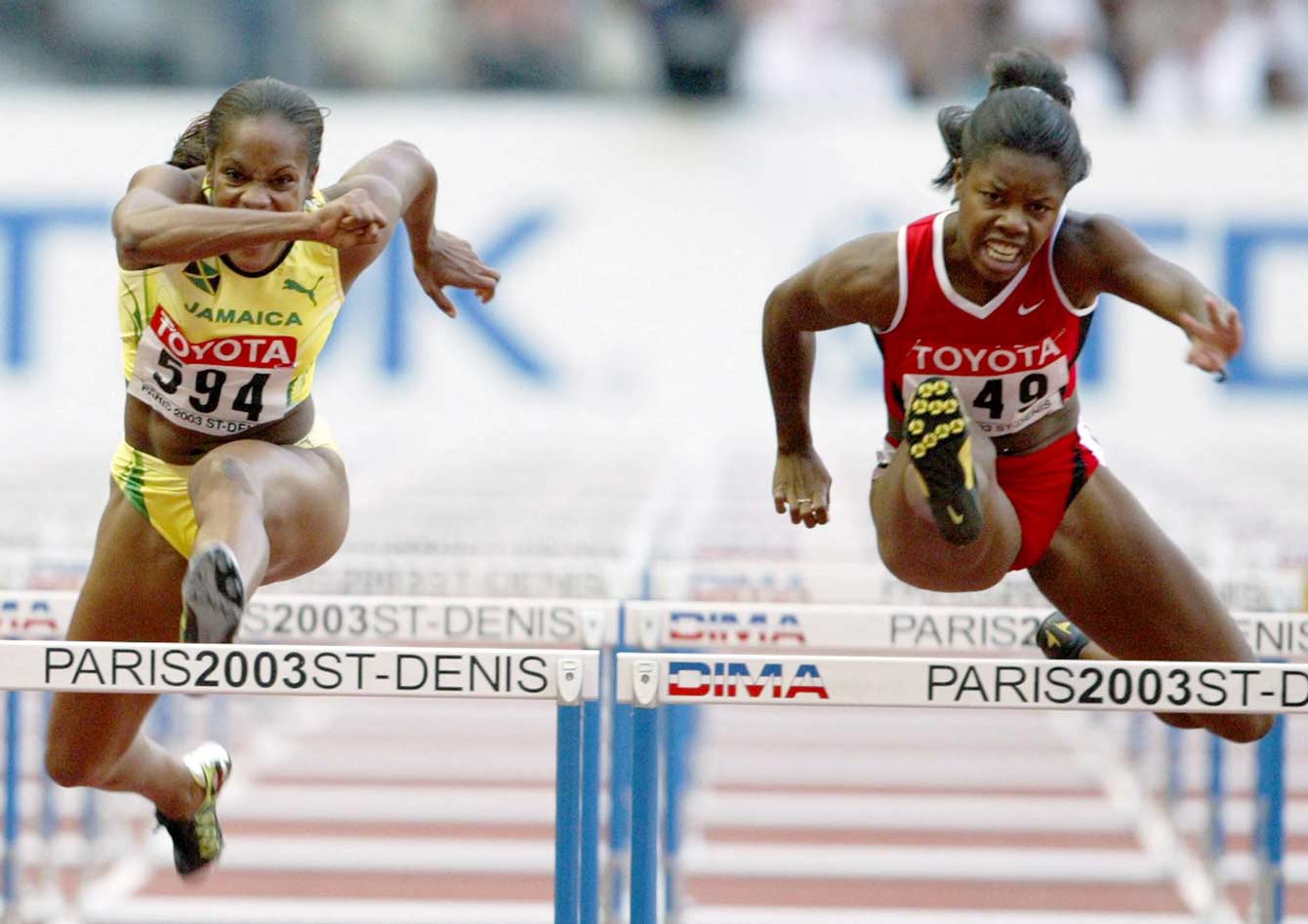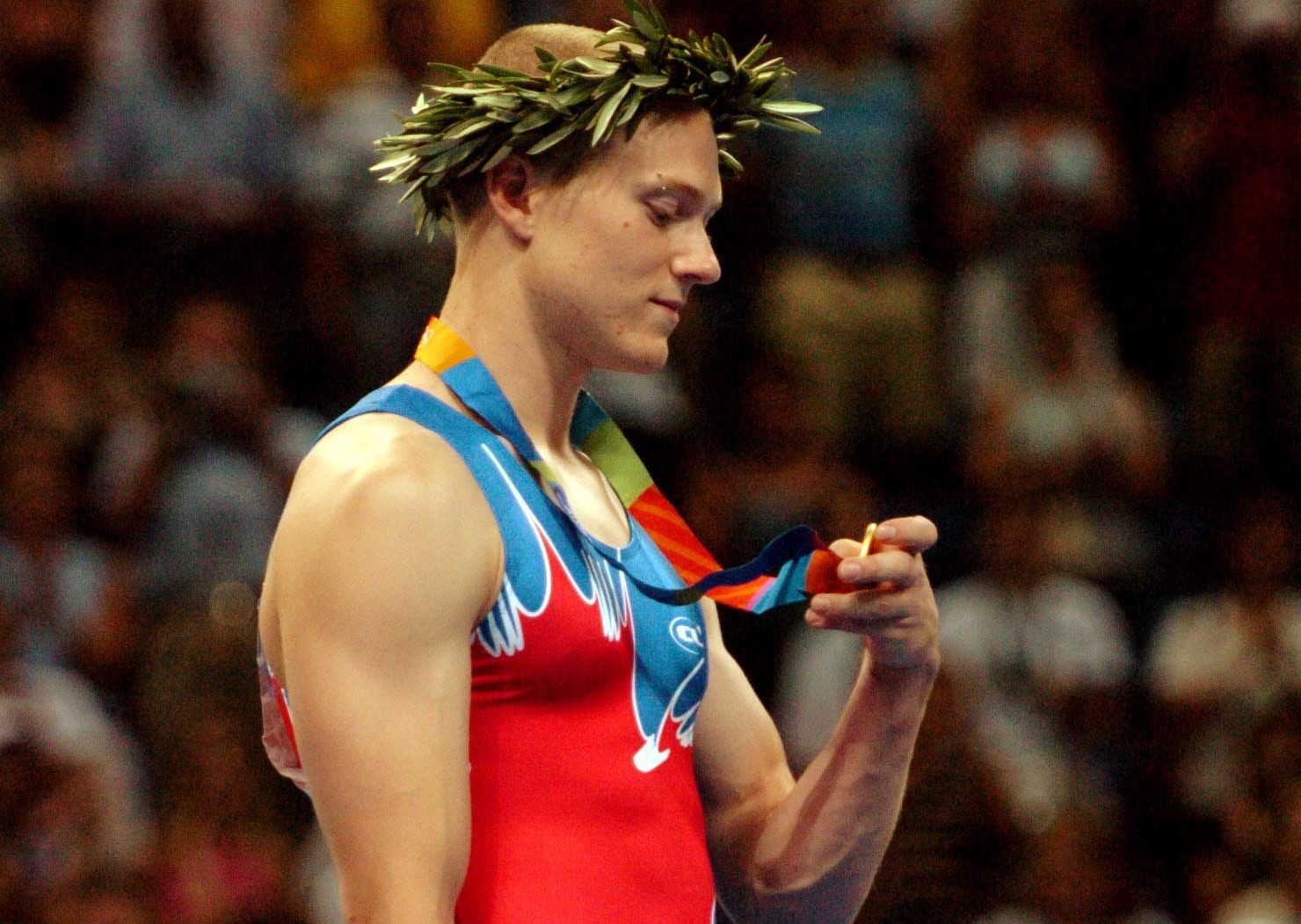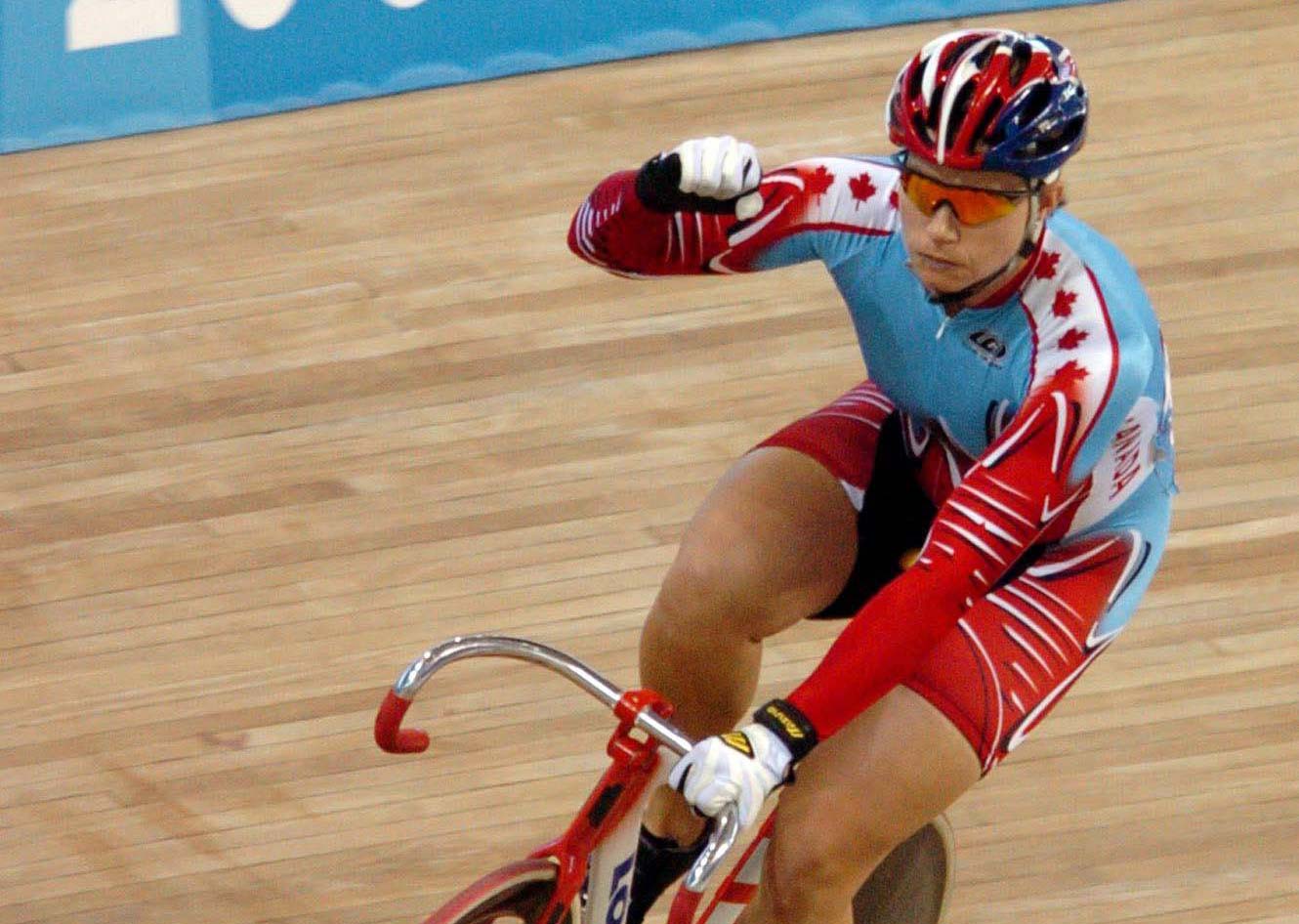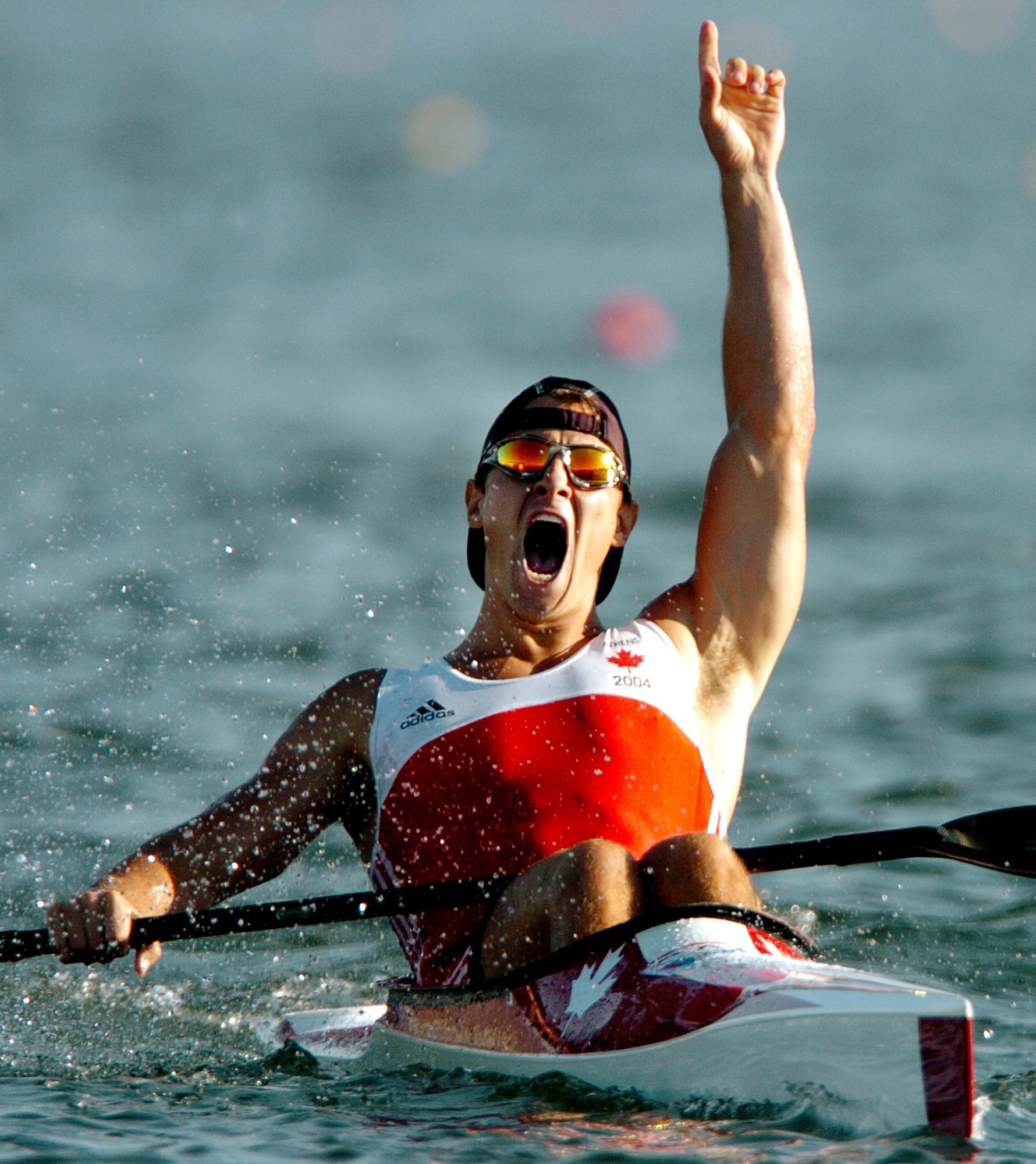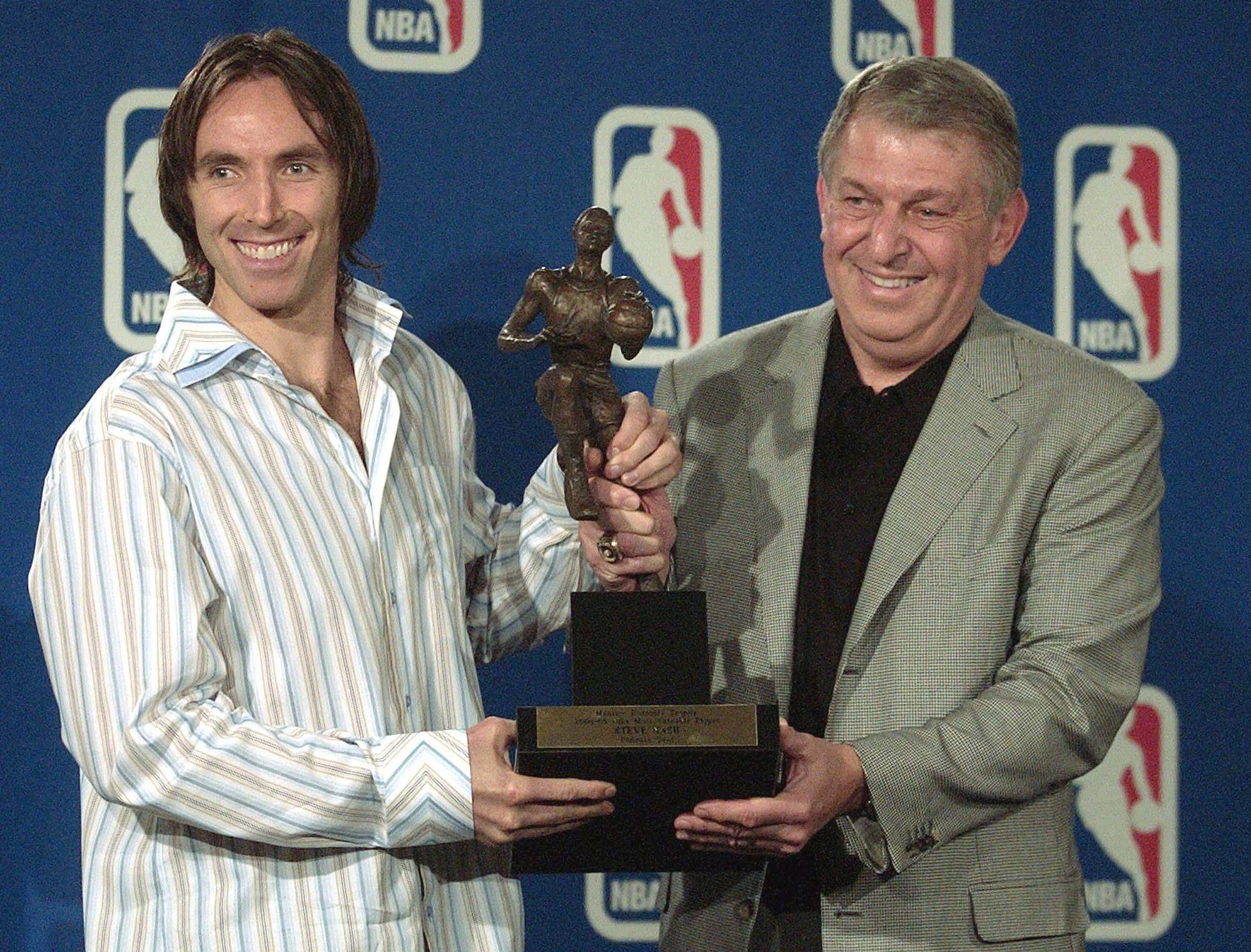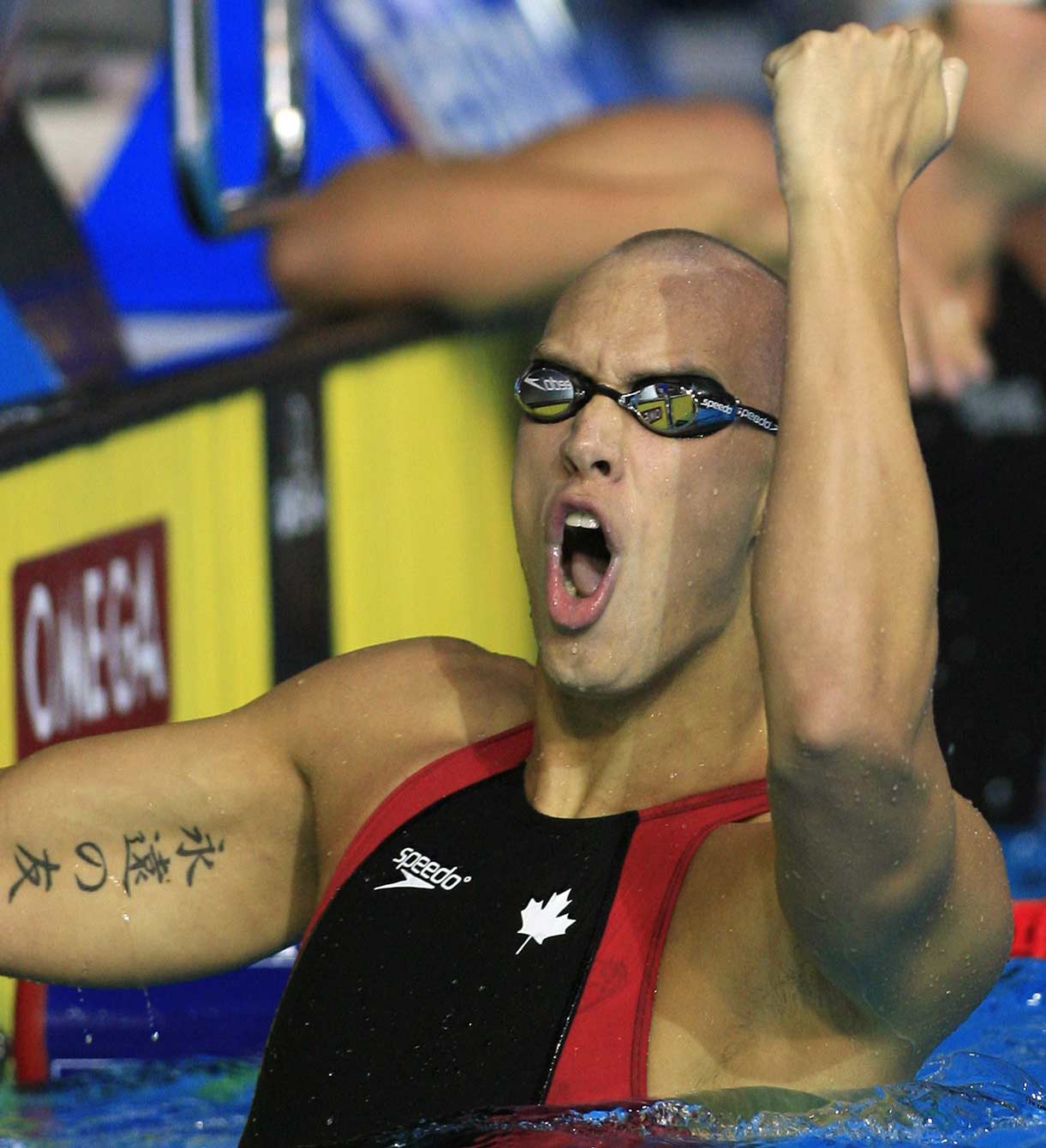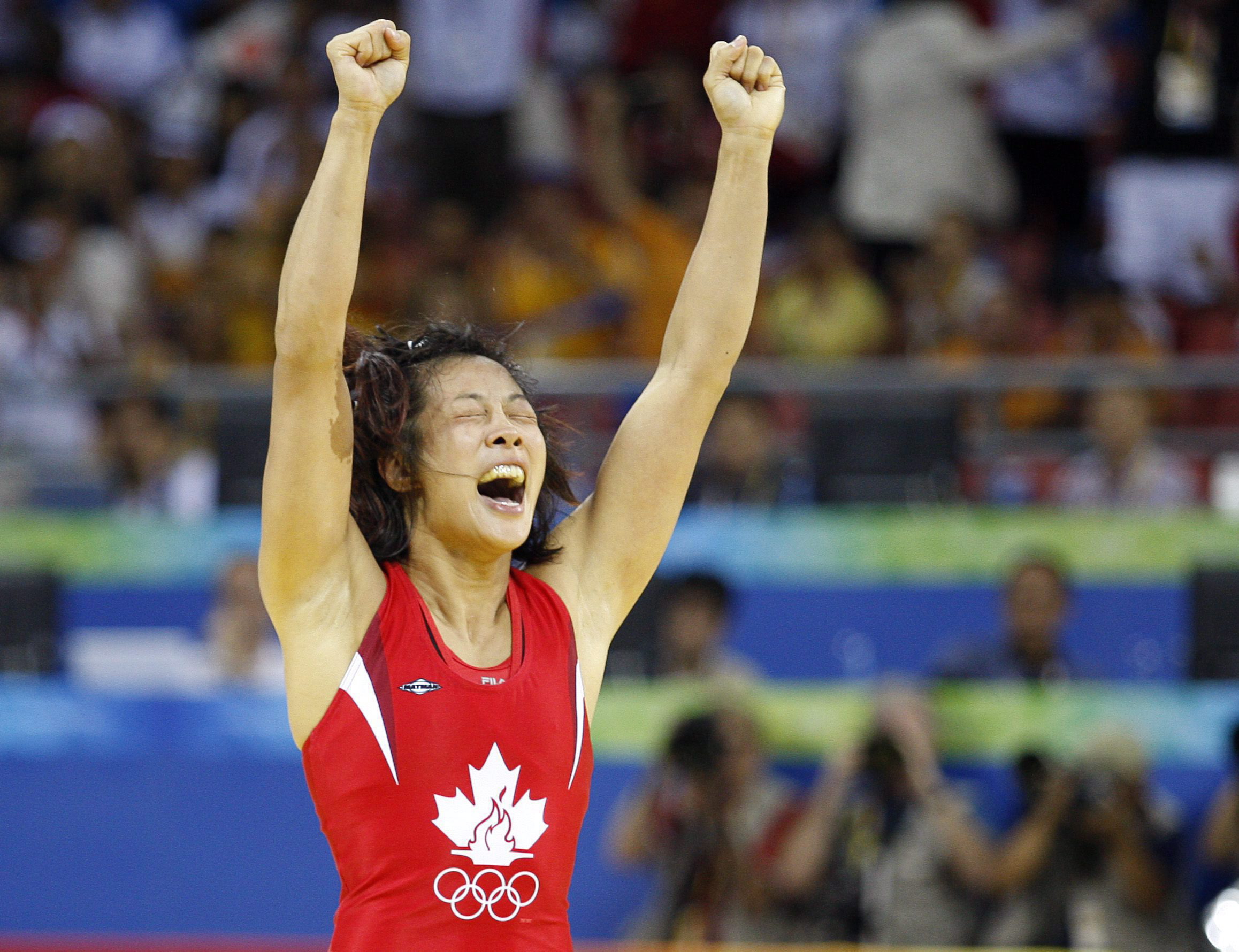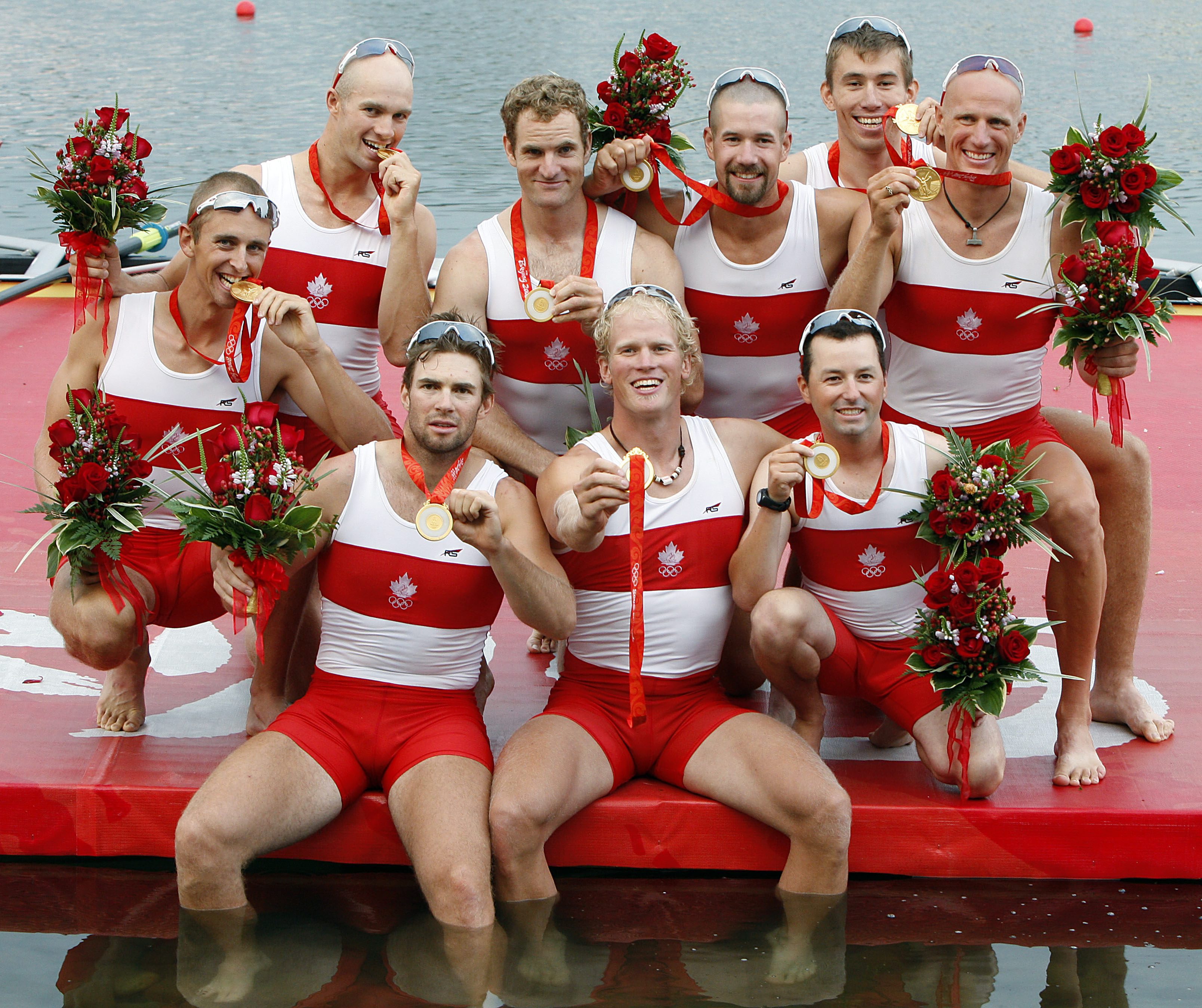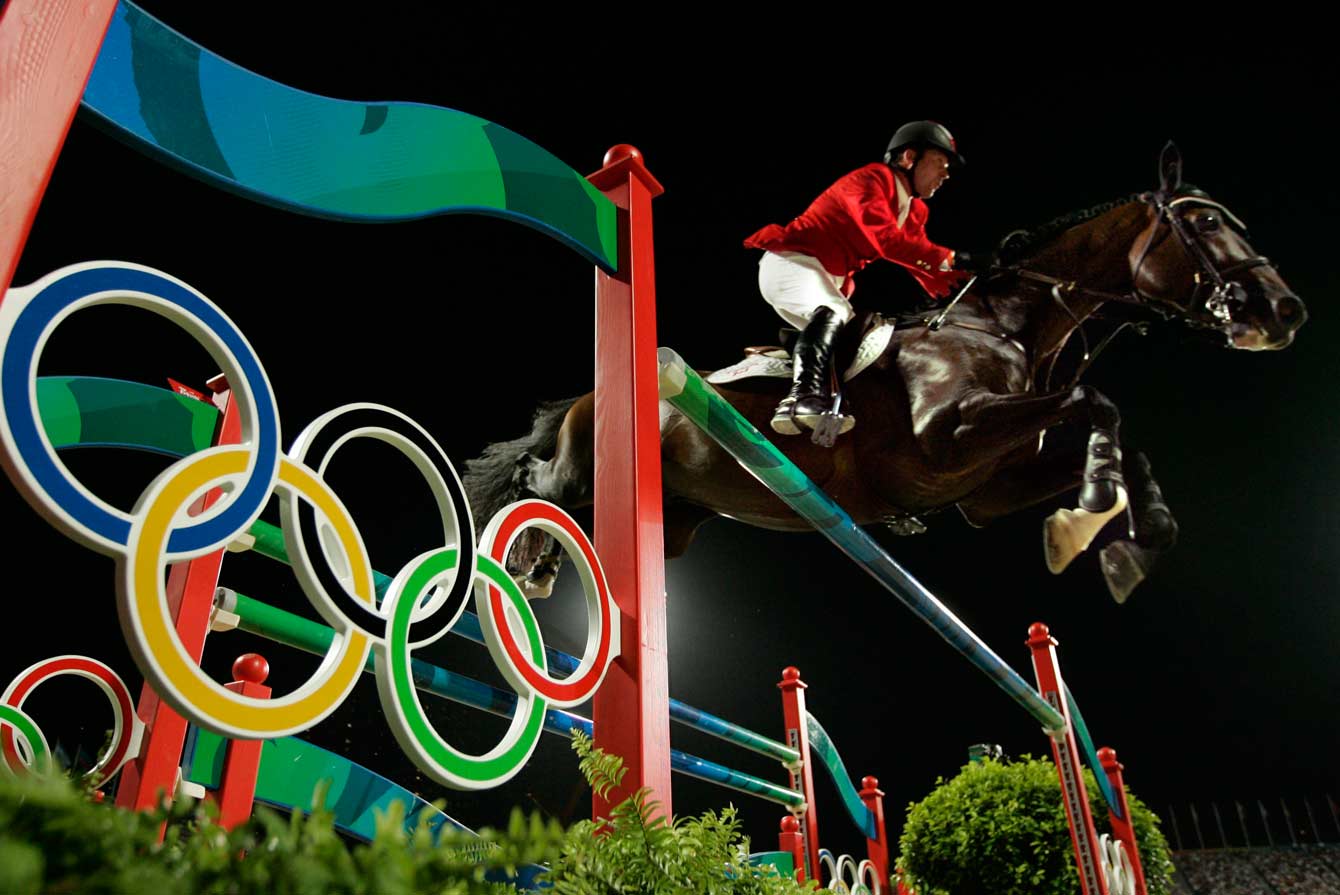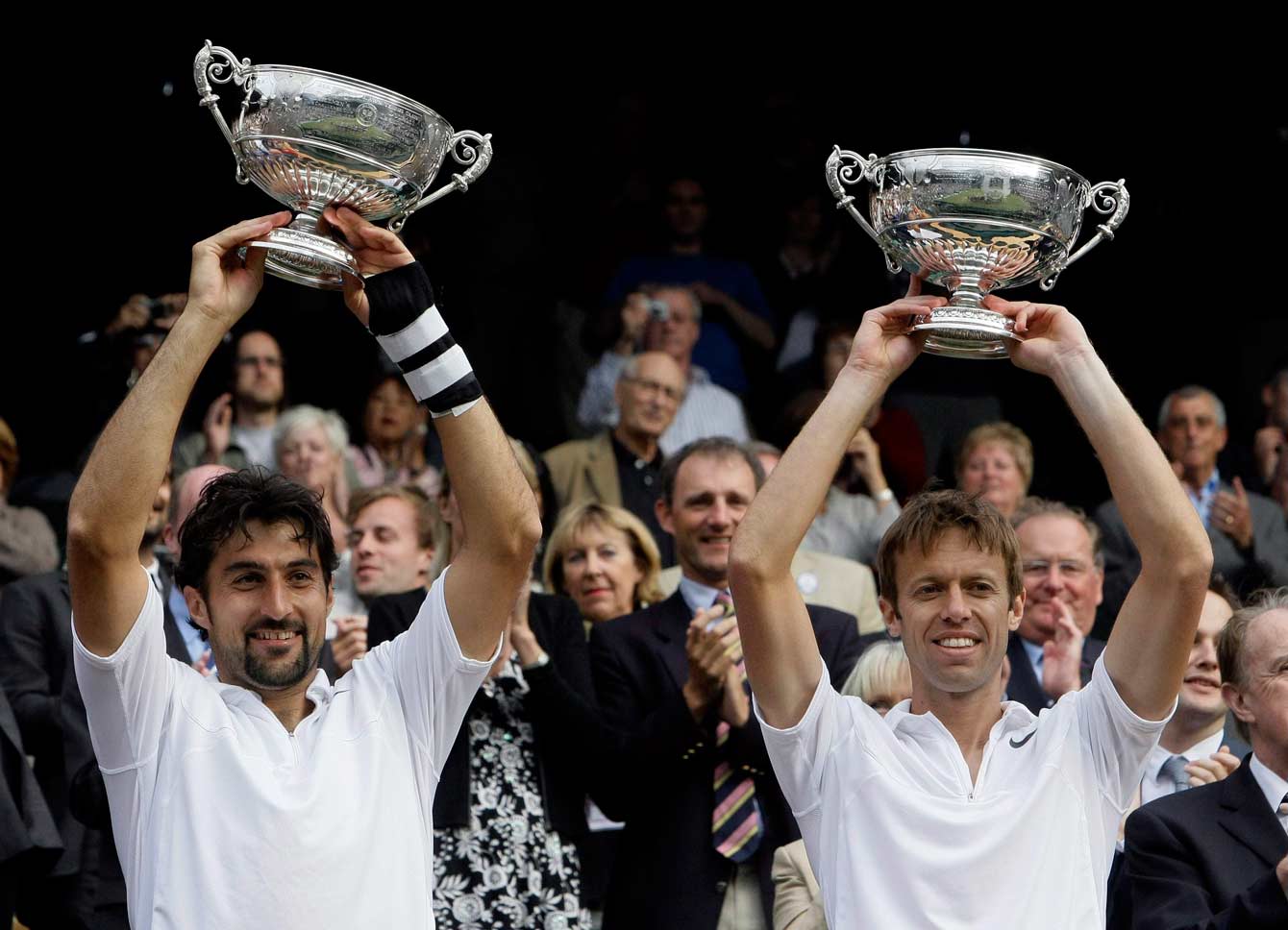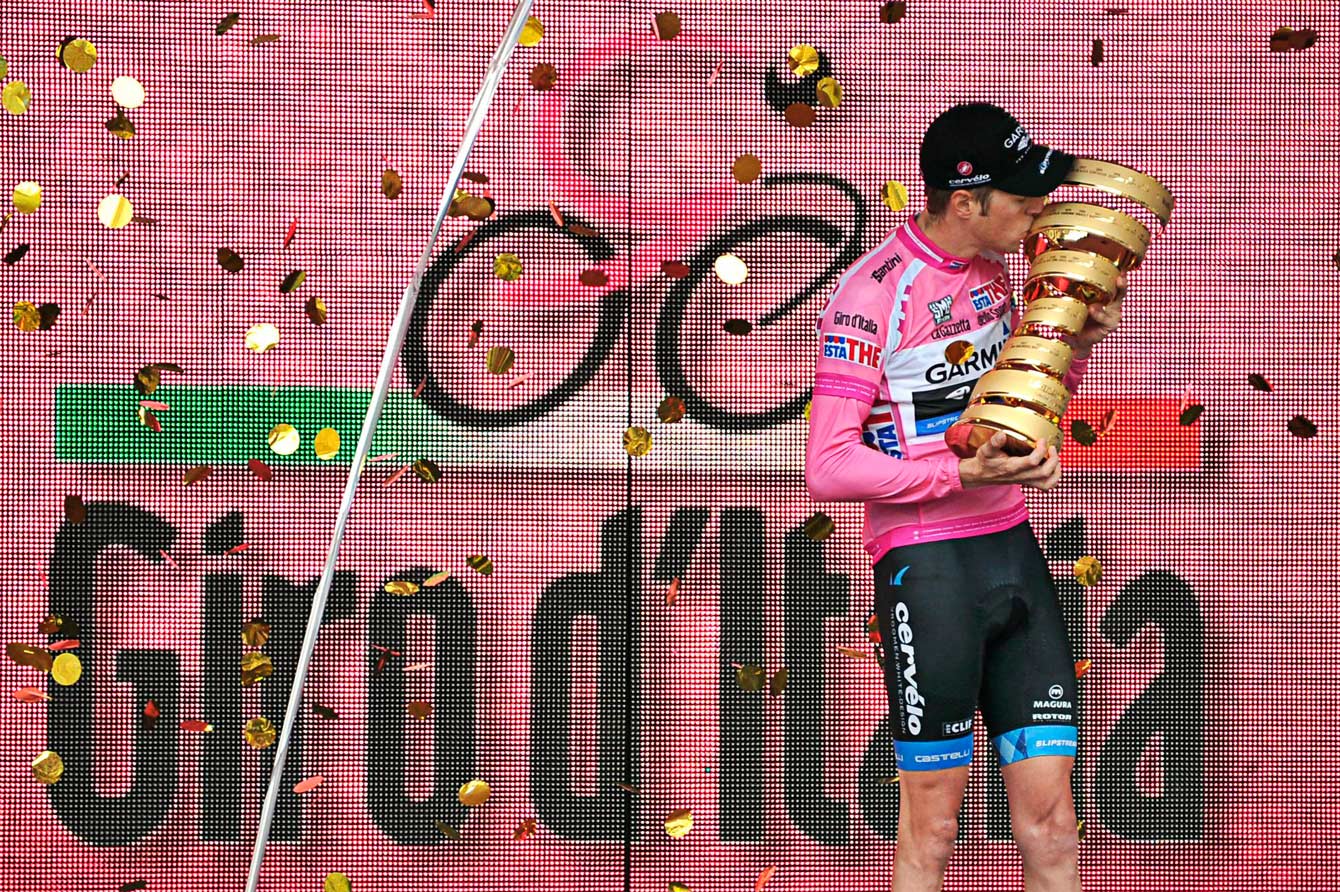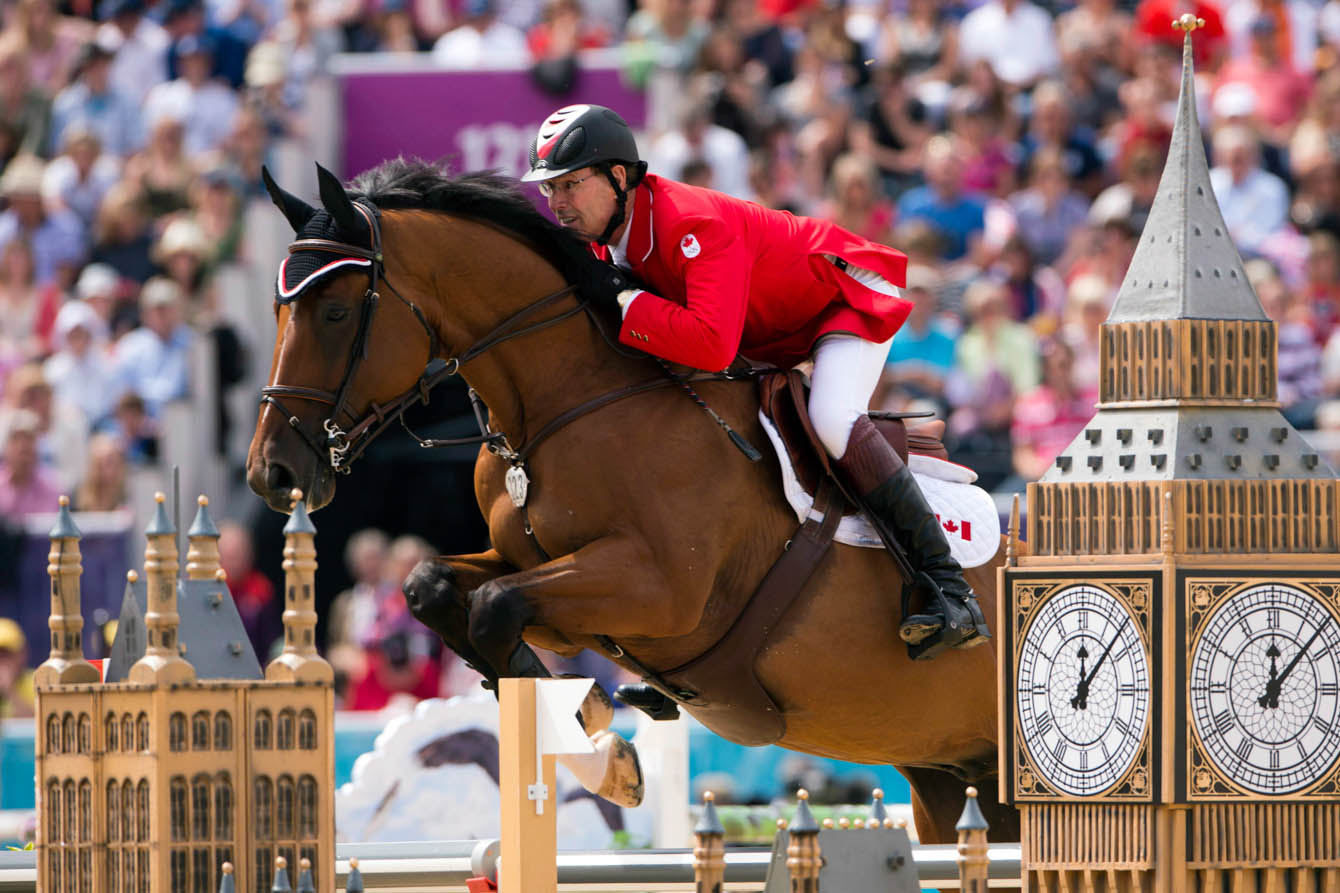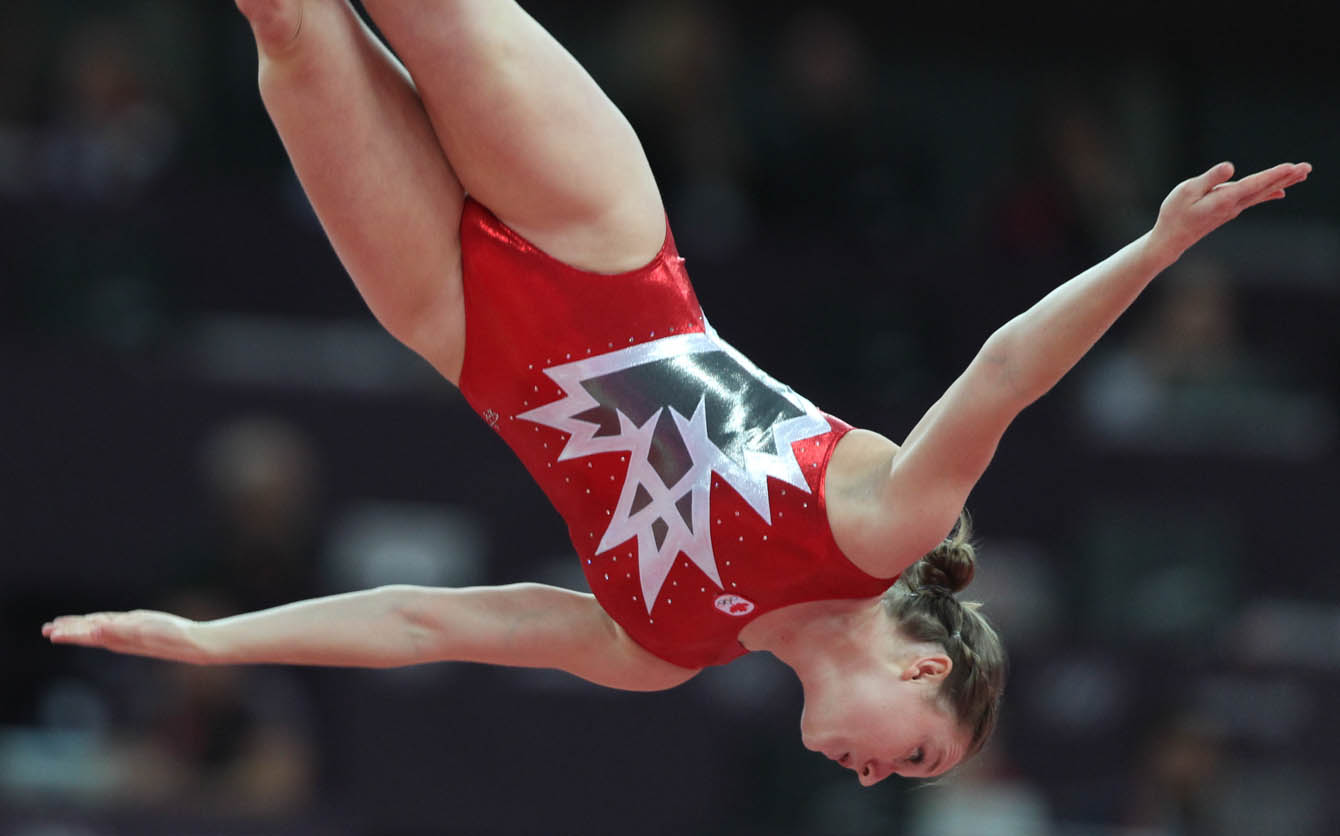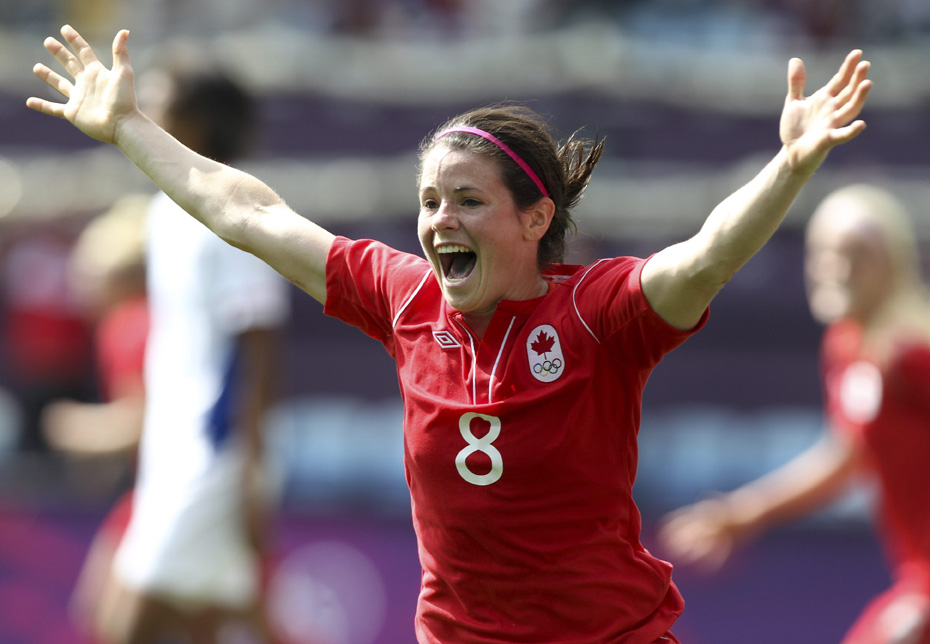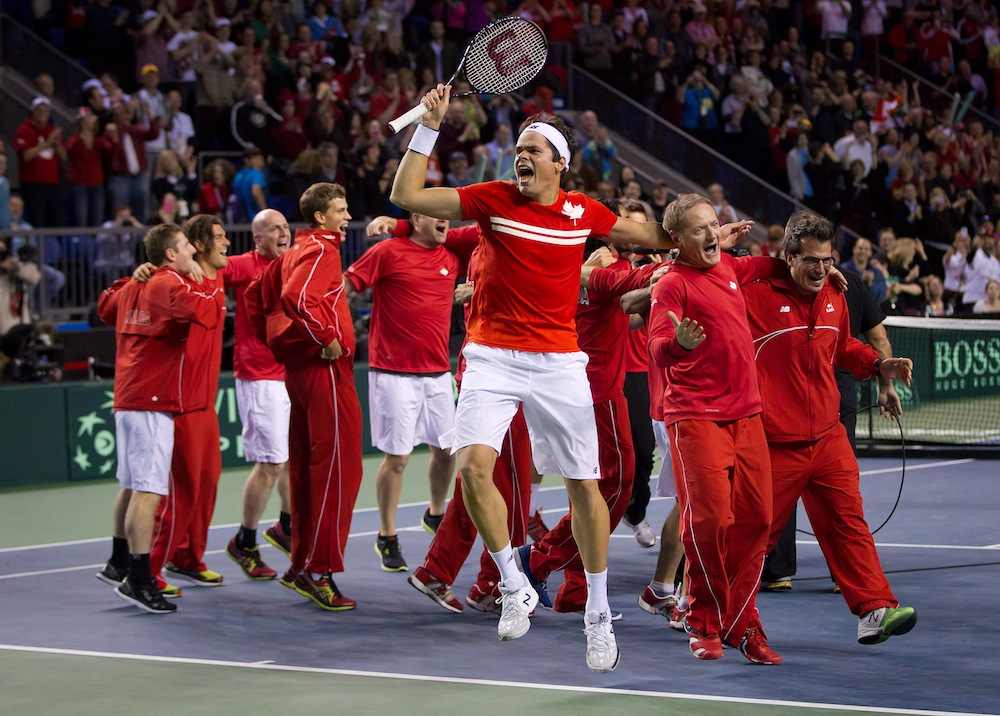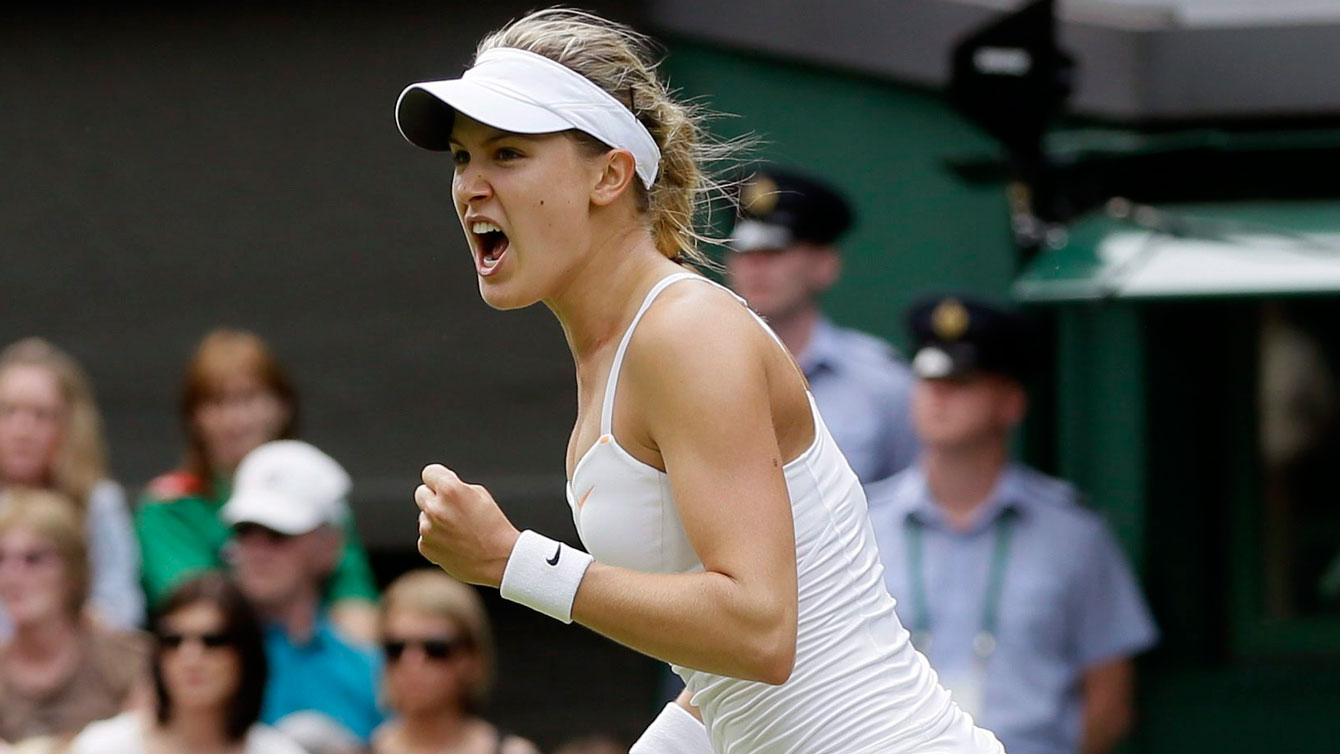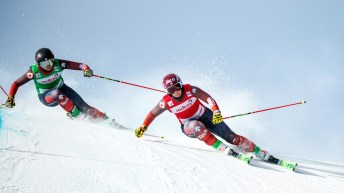What is Canada’s greatest summer sports moment of the last 20 years?
Which moment stands out as your favourite?
Take a read through our nominees and make sure you vote in the poll at the bottom of the page.
Donovan’s Double
“If you’re Canadian you have to love Saturday nights in Georgia!” Broadcaster Don Wittman had that right at Atlanta 1996. On July 27, Donovan Bailey ran a world record 9.84 seconds to win the 100m, Canada’s first Olympic champion in the event since 1928. Seven days later, he was back on the track with Robert “Blast Off” Esmie, Glenroy Gilbert and Bruny Surin, anchoring Canada’s 4x100m relay team to a dominant win. The double gold replicated the feat from the 1995 World Championships.
Triple Gold
After winning two gold medals at Barcelona 1992 in the pair and the eight, Marnie McBean and Kathleen Heddle re-teamed for Atlanta 1996, but in a new event, the double sculls. The move from sweep rowing to sculling was a successful one, as they captured a third career gold, making them the first Canadian athletes in any sport to win three Olympic gold medals. They remain the only Canadian summer Olympic athletes to accomplish that feat.
Walker Rocks
The pride of Maple Ridge, BC had been a Canadian star on a Canadian team. But the crowning achievement of his career came as a member of the Colorado Rockies in 1997. A .366 batting average with 49 home runs, 130 RBI, 33 stolen bases and 409 total bases earned him National League Most Valuable Player honours. Walker was the first Canadian to ever be an MLB MVP.
King Jacques
Jacques Villeneuve had made history in 1995 when he became the first Canadian to win the famed Indianapolis 500. Next season he moved to Formula One, the circuit on which his father Gilles had competed. After challenging for the F1 Drivers’ Title as a rookie winning four races, he took the Formula One World Championship (the only Canadian to ever do so) in 1997 on the strength of seven victories. His season-long rivalry with then double World Champion Michael Schumacher led to a dramatic final race in which the two collided and Schumacher was subsequently disqualified.
Giant Killers
The men’s doubles tennis gold medal match at Sydney 2000 was like David beating Goliath. On one side of the net were the home favourite “Woodies”, Australians Todd Woodbridge and Mark Woodforde, the defending champions and 11-time Grand Slam champions. On the other side, Canada’s Daniel Nestor and Sébastien Lareau, who had each left successful international partnerships earlier in the year with the goal of winning an Olympic medal. The gamble paid off, as the duo won Canada’s first and only Olympic tennis medal, taking the gold in four sets.
Daniel’s Dream
Daniel Igali came to Canada as a member of the Nigerian wrestling team at the 1994 Commonwealth Games. Six years later, as a proud Canadian citizen, he won the gold medal in the 69kg weight class at Sydney 2000. Igali celebrated by dancing around the Canadian flag on the mat.
Sydney Stunner
Triathlon made its Olympic debut in 2000, which meant a spectacular backdrop of the Sydney Opera House for an incredible finish. Simon Whitfield had been amongst a group of riders that crashed in the cycling portion of the race. But he was able to get up and work his way back to the leaders. During the run, he chased them down one by one before putting in a final kick to get the victory in the last 200m.
Striking Gold
Canada hasn’t made the FIFA World Cup finals since its only appearance in 1986. In the middle of that ongoing drought fans enjoyed a bright moment for men’s soccer in the summer of 2000 when Canada lifted the Gold Cup, the top national team competition award in the CONCACAF region. Canada had the feel of a team of destiny when it won a coin toss – the last resort tiebreaker – to escape its group. Then a shocking 2-1 result over Mexico, and a 1-0 win against Trinidad and Tobago in the knockout stage secured the Gold Cup since the final was against invited guest Colombia. For good measure, Canada beat the South Americans 2-0 to officially lift the region’s highest national team honour.
Master Mike
After 72 holes of competition at the 2003 Masters, Mike Weir found himself at the top of the leaderboard along with American Len Mattiace. On the tie-breaking playoff hole Weir assured himself of the green jacket by shooting a bogey, while Mattiace struggled to a double-bogey. The victory marked the first win by a Canadian at any of the four PGA Major, and only the second left-handed golfer ever to win a Major.
Paris Prize
In 2003 Perdita Felicien became the first Canadian woman to ever win a world championship medal in athletics, taking the gold in the 100m hurdles. Felicien defeated Brigitte Foster-Hylton of Jamaica by 0.04 seconds in Paris and went on to earn Canadian female athlete of the year honours.
Shewfelt Shines
At age nine he said he wanted to be Olympic champion. At 22, he did it. Then at Athens 2004, Kyle Shewfelt became Canada’s first ever Olympic medallist in artistic gymnastics when he won gold in floor exercise. Shewfelt’s performance was recognized for its flow, cleanliness, control and elegance.
Cycling Champion
At 38 years old, Lori-Ann Muenzer was the oldest competitor in the women’s track cycling sprint field at Athens 2004 by seven years. She was also on a shoestring budget, meaning she only had one set of racing wheels. During the competition, both of her tires blew out, but in a show of sportsmanship, she was given replacements by the French and Australian teams. In her semifinal she had to defeat an Australian, Anna Meares, already a gold medallist at the Games. Muenzer then swept the final, becoming Canada’s first ever Olympic champion in cycling.
AVK’s Ascent
Adam van Koeverden was Canada’s lone double medallist of the Athens 2004 Games. First for the 22-year-old was a bronze medal in the K-1 1000m. A day later he claimed the gold medal in the K-1 500m over veterans Nathan Baggaley and Ian Wynne. The kayaker was named Canadian flagbearer for the Closing Ceremony and went on to win the Lou Marsh Award.
Hardcourt Hero
In 2004-05 Steve Nash led the Phoenix Suns to the Western Conference final while averaging 11.5 assister per game to go along with a 50% field goal rate and over 43% shooting from three-point range during the regular season. The standout season finished with Nash being awarded the NBA’s MVP award. Nash became the first Canadian ever and only the third point guard in NBA history to win the award (along with Magic Johnson and Bob Cousy). He followed up that stellar season with another, leading to his second straight MVP award. Nash became only the 9th player to win the award in back-to-back seasons. Others on that list include: Tim Duncan, Michael Jordan, and Larry Bird.
Sensational Swim
The men’s 100m freestyle is one of the most exciting events in the pool. But it is one in which Canadians have not enjoyed much success – until Brent Hayden. At the 2007 World Championships, Hayden tied for the gold medal with Italy’s Filippo Magnini, not only becoming Canada’s first ever world medallist in the event, but also Canada’s first swimming world champion since 1986.
Huynh Wins
Medals were hard to come by for the Canadian team in the early days of Beijing 2008. But a week after the Games began, so did the podium finishes, led by the country’s first ever Olympic gold medallist in women’s wrestling. Carol Huynh, the daughter of refugees, provided one of the lasting images of the Games with her emotional, tear-filled reaction standing atop the podium.
Golden Redemption
Four years after missing the podium at Athens 2004, the Canadian men’s eight went to Beijing 2008 confident and with a simple race strategy for redemption: win by as much as possible. The crew of Kevin Light, Ben Rutledge, Andrew Byrnes, Jake Wetzel, Malcolm Howard, Dominic Seiterle, Adam Kreek, Kyle Hamilton and coxswain Brian Price had done just that at the 2007 World Championships. In the 2008 Olympic final, the Canadians jumped out so quickly they had a full boat length lead at the midway point, leaving no doubt they would win the gold medal.
(L)amazing Lamaze
Eric Lamaze made his Olympic debut at Beijing 2008 with his mount Hickstead. He helped Canada win the silver medal in the team event, the country’s first Olympic medal in the event since 1968. He then became Canada’s first Olympic champion in individual jumping, winning in a jump-off over Sweden’s Rolf-Goran Bengtsson. Lamaze was stellar throughout, knocking down just one rail during the entire competition.
Golden Slam
First came an Olympic gold medal in 2000 with Sébastien Lareau. That was followed by wins at the Australian Open in 2002, the US Open in 2004 and the French Open in 2007 with Mark Knowles. In 2008 he captured the Wimbledon crown with Nenad Zimonjic. With that Nestor joined an exclusive club (the only Canadian member), winners of the Golden Slam – all four tennis Grand Slams plus Olympic gold.
Ryder Rides
In a sport that has traditionally been dominated by Europeans, Ryder Hesjedal broke through in 2012 by winning the Giro d’Italia, becoming the first Canadian to win one of cycling’s Grand Tours (Tour de France and Vuelta a Espana the others). He was just the second non-European to win the Giro. Hesjedal had worn the maglia rosa in four stages of the race before taking it one last time in the final stage, winning the general classification.
Mr Olympics
London 2012 marked show jumper Ian Millar‘s 10th appearance at an Olympic Games, which put him in sole possession of the most ever Olympic appearances. Millar’s only medal is a silver from the Beijing 2008 Team Jumping event.
London Landing
Rosie MacLennan bounced her way into Canadians’ hearts when she won Canada’s first, and only, gold medal at the London 2012 Games. With the medal, Canada continued their streak of having won a trampoline medal at every Olympics that the sport was contested.
Manchester Mugging
Team Canada surprised many teams at the London 2012 Women’s Soccer tournament. Captain Christine Sinclair scored 3 goals in their semifinal versus the USA in Manchester, but sadly the USA rallied to win 4-3, albeit with great controversy. The sadness didn’t last long though, as the Canadian women stunned the French team in the Bronze Medal Match with an injury time goal from Diana Matheson (above) that sealed a 1-0 victory.
Final Four
For years Canada’s best non-Olympic tennis moment had been when a 19-year-old Daniel Nestor defeated then world number one Stefan Edberg during a Davis Cup match in 1992. Two decades later, Nestor was the veteran of the squad led by breakout star Milos Raonic that proved Canada could compete with the best. Along with Frank Dancevic as well as Vasek Pospisil, who sometimes pulled double duty in singles and doubles, the Canadians defeated top-ranked Spain in the first round, followed by Italy in the quarterfinals before falling to Serbia in the final four featuring world number one Novak Djokovic in Belgrade.
Just Grand
Through the first three Grand Slams of 2014, only one woman made it to the semifinals each time – Canada’s Eugenie Bouchard. But at Wimbledon she reached a new high by advancing to the final, the first time a Canadian singles player had ever reached a Grand Slam final in the Open era. Bouchard would lose to 2011 champion Petra Kvitova, but became the world’s seventh ranked player, the best by a Canadian in WTA history.

